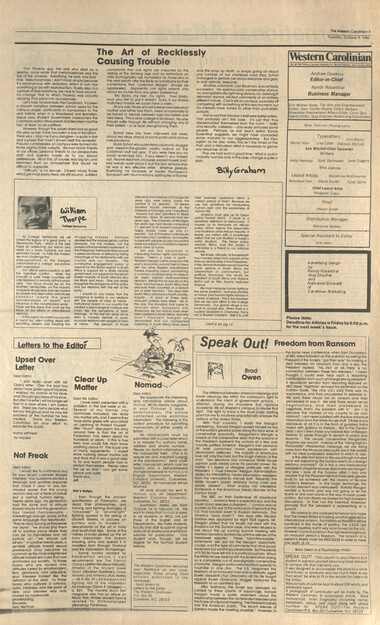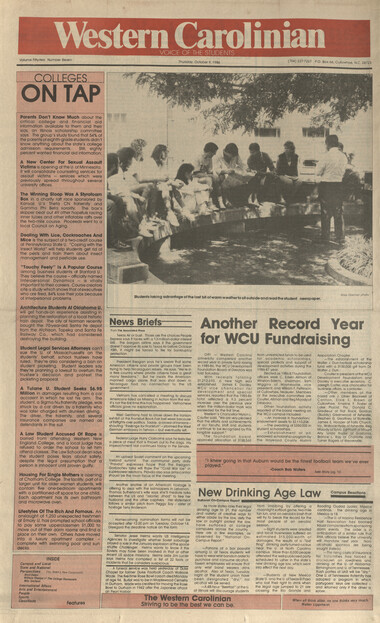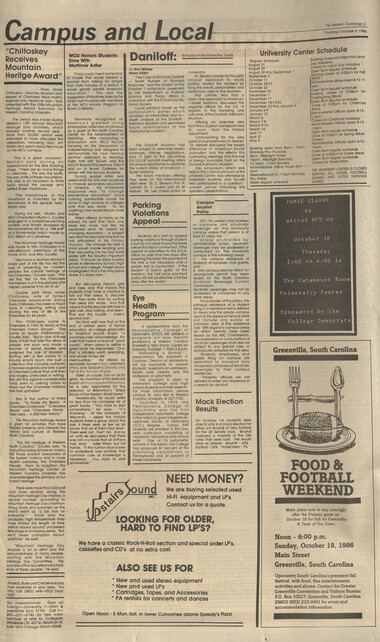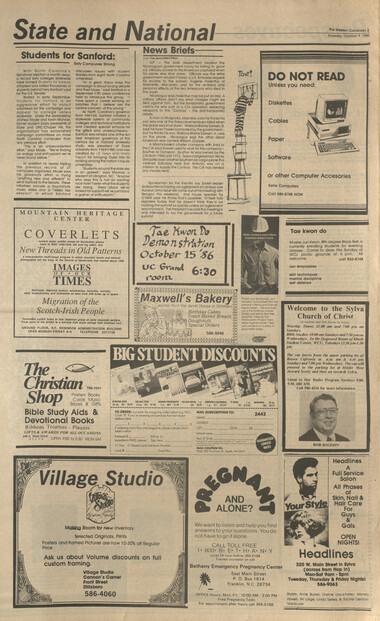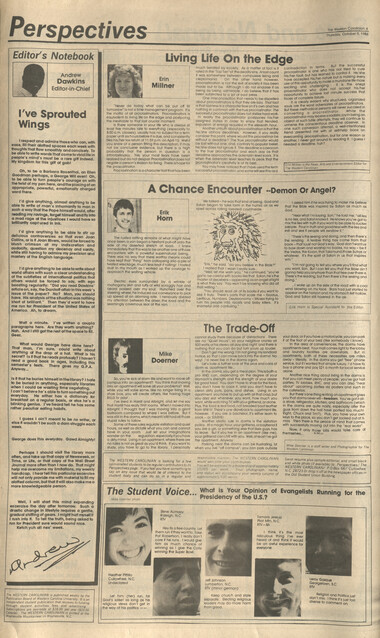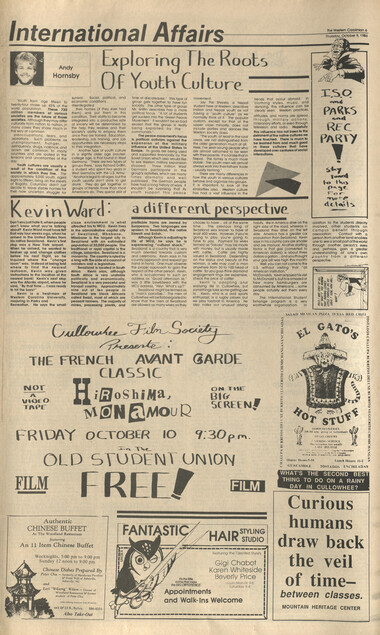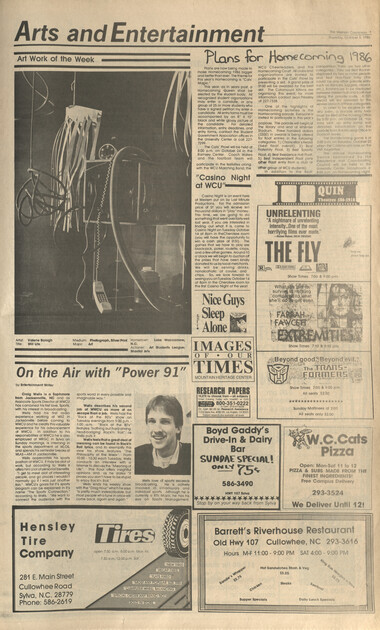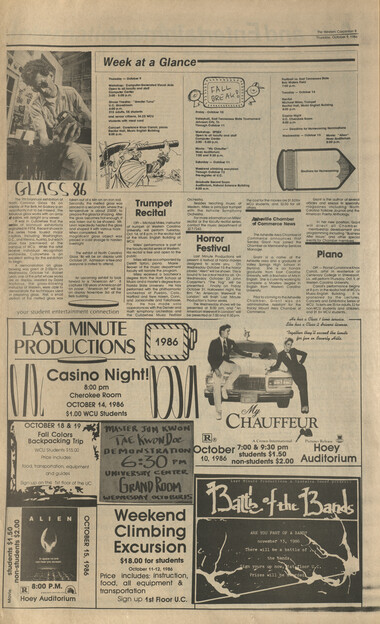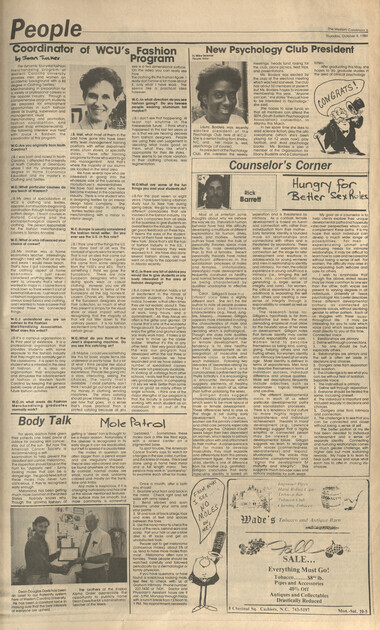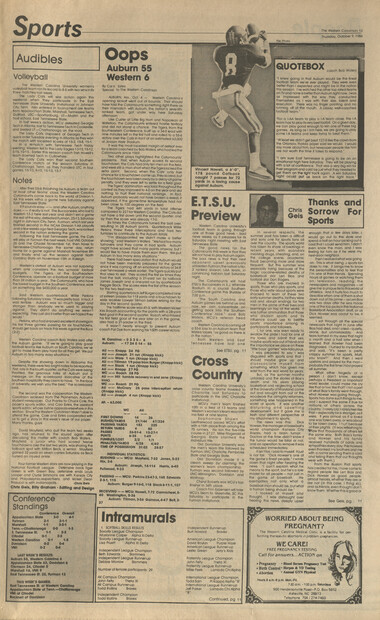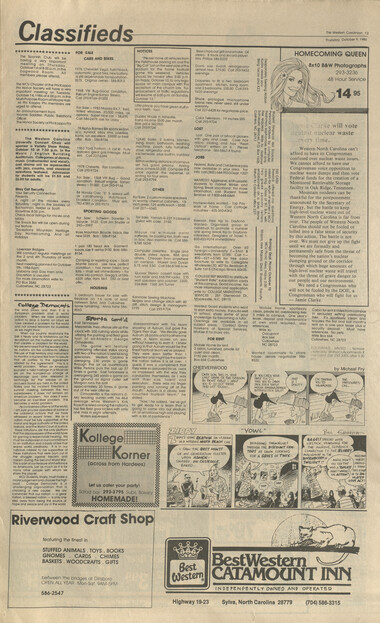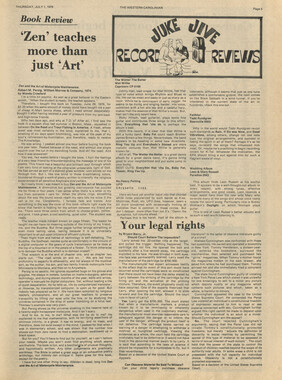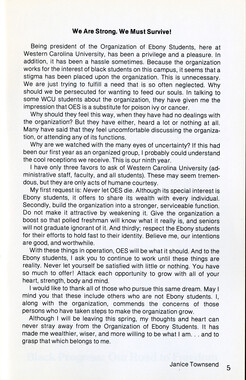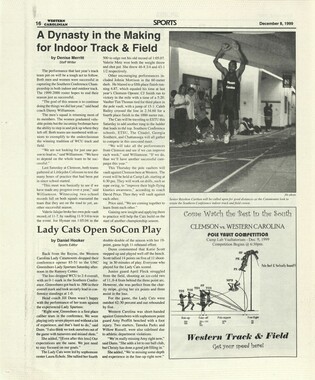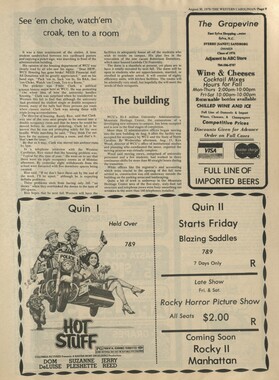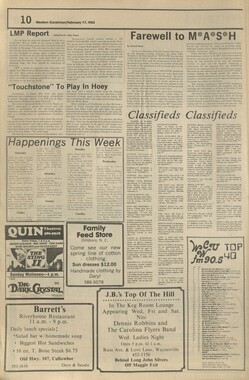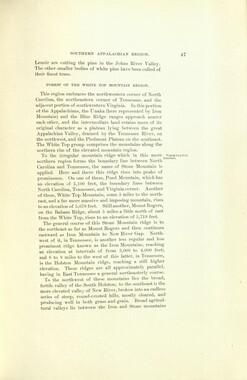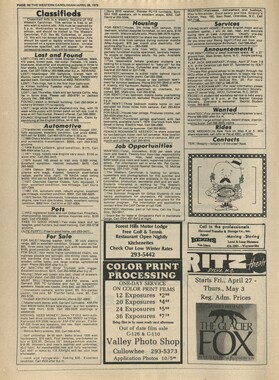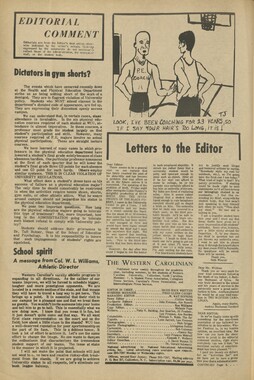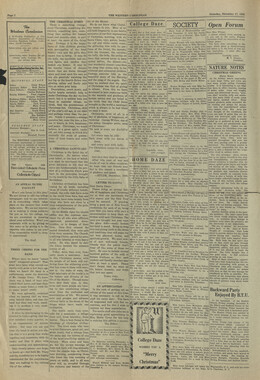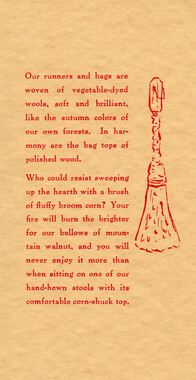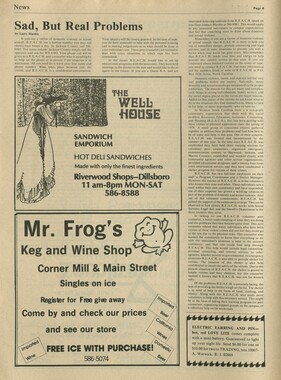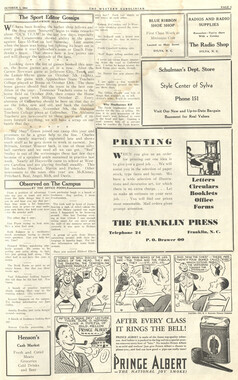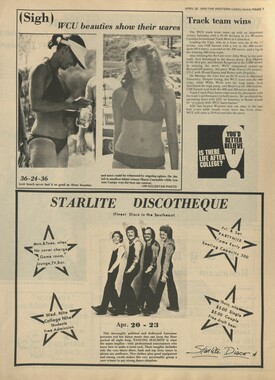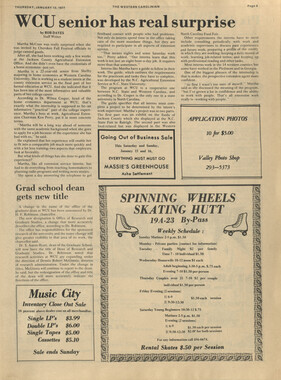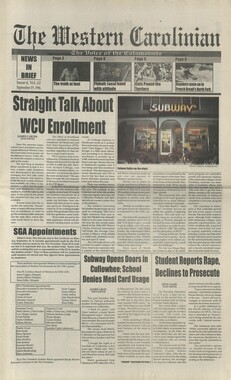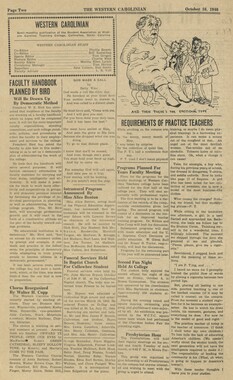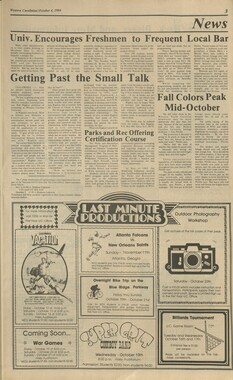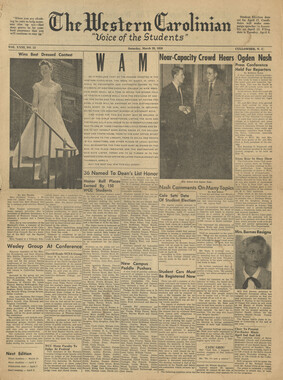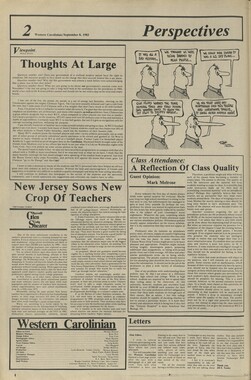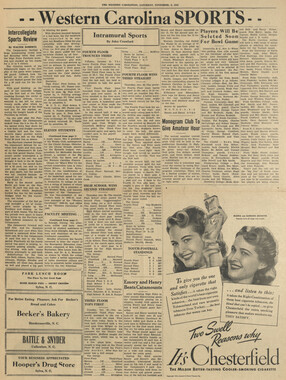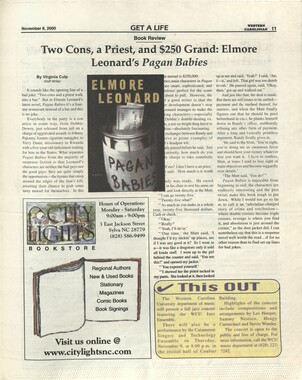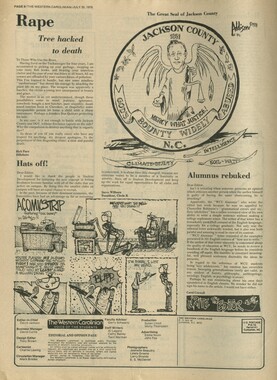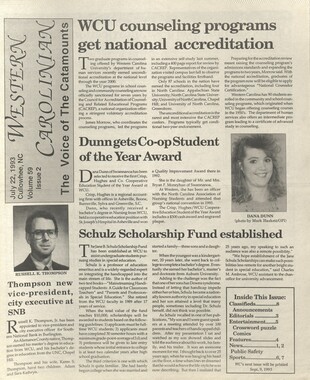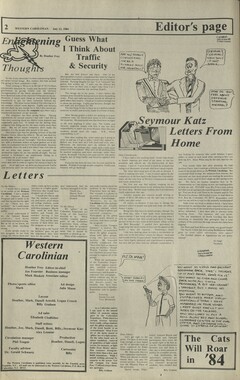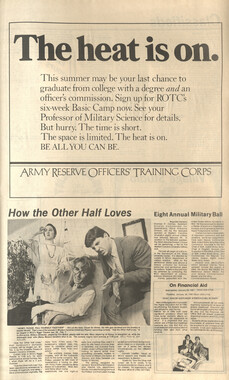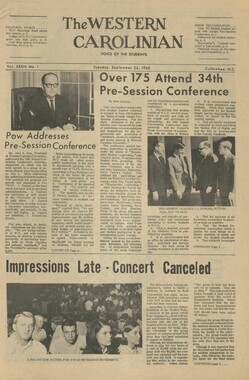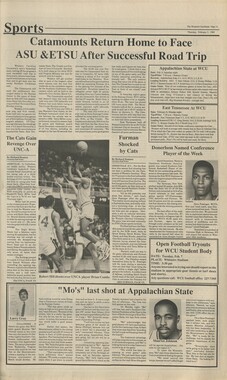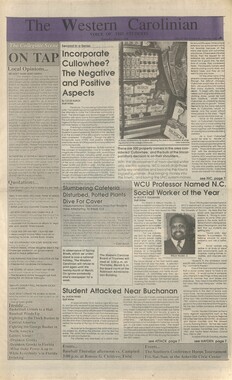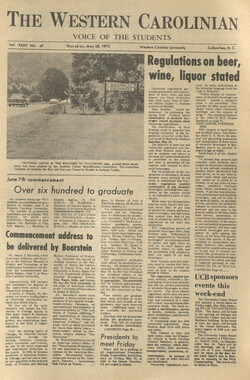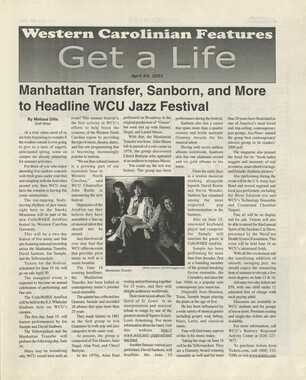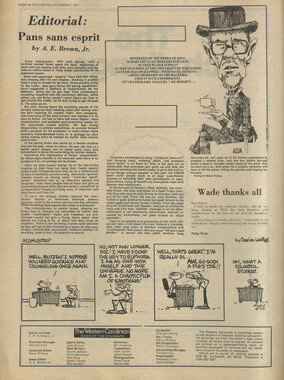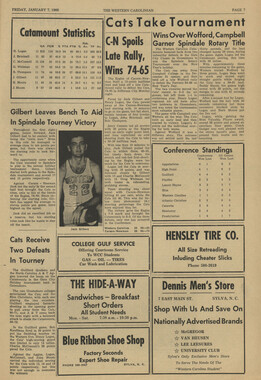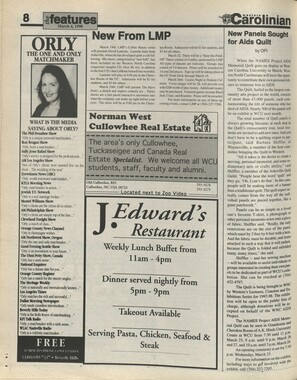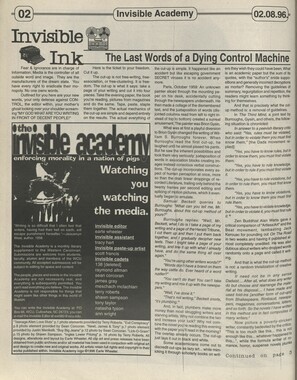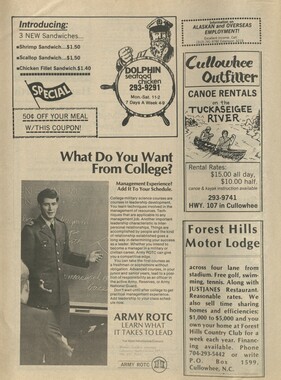Western Carolina University (20)
View all
- Canton Champion Fibre Company (2308)
- Cherokee Traditions (293)
- Civil War in Southern Appalachia (165)
- Craft Revival (1942)
- Great Smoky Mountains - A Park for America (2767)
- Highlights from Western Carolina University (430)
- Horace Kephart (941)
- Journeys Through Jackson (154)
- LGBTQIA+ Archive of Jackson County (24)
- Oral Histories of Western North Carolina (314)
- Picturing Appalachia (6772)
- Stories of Mountain Folk (413)
- Travel Western North Carolina (160)
- Western Carolina University Fine Art Museum Vitreograph Collection (129)
- Western Carolina University Herbarium (92)
- Western Carolina University: Making Memories (708)
- Western Carolina University Publications (2283)
- Western Carolina University Restricted Electronic Theses and Dissertations (146)
- Western North Carolina Regional Maps (71)
- World War II in Southern Appalachia (131)
University of North Carolina Asheville (6)
View all
- Allanstand Cottage Industries (62)
- Appalachian National Park Association (53)
- Bennett, Kelly, 1890-1974 (1388)
- Berry, Walter (76)
- Brasstown Carvers (40)
- Carver, George Washington, 1864?-1943 (26)
- Cathey, Joseph, 1803-1874 (1)
- Champion Fibre Company (233)
- Champion Paper and Fibre Company (297)
- Cherokee Indian Fair Association (16)
- Cherokee Language Program (22)
- Crowe, Amanda (40)
- Edmonston, Thomas Benton, 1842-1907 (7)
- Ensley, A. L. (Abraham Lincoln), 1865-1948 (275)
- Fromer, Irving Rhodes, 1913-1994 (70)
- George Butz (BFS 1907) (46)
- Goodrich, Frances Louisa (120)
- Grant, George Alexander, 1891-1964 (96)
- Heard, Marian Gladys (60)
- Kephart, Calvin, 1883-1969 (15)
- Kephart, Horace, 1862-1931 (313)
- Kephart, Laura, 1862-1954 (39)
- Laney, Gideon Thomas, 1889-1976 (439)
- Masa, George, 1881-1933 (61)
- McElhinney, William Julian, 1896-1953 (44)
- Niggli, Josephina, 1910-1983 (10)
- North Carolina Park Commission (105)
- Osborne, Kezia Stradley (9)
- Owens, Samuel Robert, 1918-1995 (11)
- Penland Weavers and Potters (36)
- Roberts, Vivienne (15)
- Roth, Albert, 1890-1974 (142)
- Schenck, Carl Alwin, 1868-1955 (1)
- Sherrill's Photography Studio (2565)
- Southern Highland Handicraft Guild (127)
- Southern Highlanders, Inc. (71)
- Stalcup, Jesse Bryson (46)
- Stearns, I. K. (213)
- Thompson, James Edward, 1880-1976 (226)
- United States. Indian Arts and Crafts Board (130)
- USFS (683)
- Vance, Zebulon Baird, 1830-1894 (1)
- Weaver, Zebulon, 1872-1948 (58)
- Western Carolina College (230)
- Western Carolina Teachers College (282)
- Western Carolina University (1794)
- Western Carolina University. Mountain Heritage Center (18)
- Whitman, Walt, 1819-1892 (10)
- Wilburn, Hiram Coleman, 1880-1967 (73)
- Williams, Isadora (3)
- Cain, Doreyl Ammons (0)
- Crittenden, Lorraine (0)
- Rhodes, Judy (0)
- Smith, Edward Clark (0)
- Appalachian Region, Southern (2393)
- Asheville (N.C.) (1887)
- Avery County (N.C.) (26)
- Blount County (Tenn.) (161)
- Buncombe County (N.C.) (1664)
- Cherokee County (N.C.) (283)
- Clay County (N.C.) (555)
- Graham County (N.C.) (233)
- Great Smoky Mountains National Park (N.C. and Tenn.) (478)
- Haywood County (N.C.) (3522)
- Henderson County (N.C.) (70)
- Jackson County (N.C.) (4692)
- Knox County (Tenn.) (25)
- Knoxville (Tenn.) (12)
- Lake Santeetlah (N.C.) (10)
- Macon County (N.C.) (420)
- Madison County (N.C.) (211)
- McDowell County (N.C.) (39)
- Mitchell County (N.C.) (132)
- Polk County (N.C.) (35)
- Qualla Boundary (981)
- Rutherford County (N.C.) (76)
- Swain County (N.C.) (2113)
- Transylvania County (N.C.) (247)
- Watauga County (N.C.) (12)
- Waynesville (N.C.) (68)
- Yancey County (N.C.) (72)
- Aerial Photographs (3)
- Aerial Views (60)
- Albums (books) (4)
- Articles (1)
- Artifacts (object Genre) (228)
- Biography (general Genre) (2)
- Cards (information Artifacts) (38)
- Clippings (information Artifacts) (191)
- Crafts (art Genres) (622)
- Depictions (visual Works) (21)
- Design Drawings (1)
- Drawings (visual Works) (184)
- Envelopes (73)
- Facsimiles (reproductions) (1)
- Fiction (general Genre) (4)
- Financial Records (12)
- Fliers (printed Matter) (67)
- Glass Plate Negatives (381)
- Guidebooks (2)
- Internegatives (10)
- Interviews (811)
- Land Surveys (102)
- Letters (correspondence) (1013)
- Manuscripts (documents) (619)
- Maps (documents) (159)
- Memorandums (25)
- Minutes (administrative Records) (59)
- Negatives (photographs) (5835)
- Newsletters (1285)
- Newspapers (2)
- Occupation Currency (1)
- Paintings (visual Works) (1)
- Pen And Ink Drawings (1)
- Periodicals (193)
- Personal Narratives (7)
- Photographs (12975)
- Plans (maps) (1)
- Poetry (6)
- Portraits (1663)
- Postcards (329)
- Programs (documents) (151)
- Publications (documents) (2237)
- Questionnaires (65)
- Scrapbooks (282)
- Sheet Music (1)
- Slides (photographs) (402)
- Sound Recordings (796)
- Specimens (92)
- Speeches (documents) (15)
- Tintypes (photographs) (8)
- Transcripts (322)
- Video Recordings (physical Artifacts) (23)
- Vitreographs (129)
- Text Messages (0)
- A.L. Ensley Collection (275)
- Appalachian Industrial School Records (7)
- Appalachian National Park Association Records (336)
- Axley-Meroney Collection (2)
- Bayard Wootten Photograph Collection (20)
- Bethel Rural Community Organization Collection (7)
- Blumer Collection (5)
- C.W. Slagle Collection (20)
- Canton Area Historical Museum (2110)
- Carlos C. Campbell Collection (282)
- Cataloochee History Project (65)
- Cherokee Studies Collection (4)
- Daisy Dame Photograph Album (5)
- Daniel Boone VI Collection (1)
- Doris Ulmann Photograph Collection (112)
- Elizabeth H. Lasley Collection (1)
- Elizabeth Woolworth Szold Fleharty Collection (4)
- Frank Fry Collection (95)
- George Masa Collection (173)
- Gideon Laney Collection (452)
- Hazel Scarborough Collection (2)
- Hiram C. Wilburn Papers (28)
- Historic Photographs Collection (236)
- Horace Kephart Collection (861)
- Humbard Collection (33)
- Hunter and Weaver Families Collection (1)
- I. D. Blumenthal Collection (4)
- Isadora Williams Collection (4)
- Jesse Bryson Stalcup Collection (47)
- Jim Thompson Collection (224)
- John B. Battle Collection (7)
- John C. Campbell Folk School Records (80)
- John Parris Collection (6)
- Judaculla Rock project (2)
- Kelly Bennett Collection (1407)
- Love Family Papers (11)
- Major Wiley Parris Civil War Letters (3)
- Map Collection (12)
- McFee-Misemer Civil War Letters (34)
- Mountain Heritage Center Collection (4)
- Norburn - Robertson - Thomson Families Collection (44)
- Pauline Hood Collection (7)
- Pre-Guild Collection (2)
- Qualla Arts and Crafts Mutual Collection (12)
- R.A. Romanes Collection (681)
- Rosser H. Taylor Collection (1)
- Samuel Robert Owens Collection (94)
- Sara Madison Collection (144)
- Sherrill Studio Photo Collection (2558)
- Smoky Mountains Hiking Club Collection (616)
- Stories of Mountain Folk - Radio Programs (374)
- The Reporter, Western Carolina University (510)
- Venoy and Elizabeth Reed Collection (16)
- WCU Gender and Sexuality Oral History Project (32)
- WCU Mountain Heritage Center Oral Histories (25)
- WCU Oral History Collection - Mountain People, Mountain Lives (71)
- WCU Students Newspapers Collection (1744)
- Western North Carolina Tomorrow Black Oral History Project (69)
- William Williams Stringfield Collection (2)
- Zebulon Weaver Collection (109)
- African Americans (390)
- Appalachian Trail (35)
- Artisans (521)
- Cherokee art (84)
- Cherokee artists -- North Carolina (10)
- Cherokee language (21)
- Cherokee pottery (101)
- Cherokee women (208)
- Church buildings (167)
- Civilian Conservation Corps (U.S.) (110)
- College student newspapers and periodicals (1830)
- Dams (103)
- Dance (1023)
- Education (222)
- Floods (61)
- Folk music (1015)
- Forced removal, 1813-1903 (2)
- Forest conservation (220)
- Forests and forestry (917)
- Gender nonconformity (4)
- Great Smoky Mountains National Park (N.C. and Tenn.) (154)
- Hunting (38)
- Landscape photography (10)
- Logging (103)
- Maps (84)
- Mines and mineral resources (8)
- North Carolina -- Maps (18)
- Paper industry (38)
- Postcards (255)
- Pottery (135)
- Railroad trains (71)
- Rural electrification -- North Carolina, Western (3)
- School integration -- Southern States (2)
- Segregation -- North Carolina, Western (5)
- Slavery (5)
- Sports (452)
- Storytelling (245)
- Waterfalls -- Great Smoky Mountains (N.C. and Tenn.) (66)
- Weaving -- Appalachian Region, Southern (280)
- Wood-carving -- Appalachian Region, Southern (328)
- World War, 1939-1945 (173)
Western Carolinian Volume 52 Number 11, October 9, 1986
Item
Item’s are ‘child’ level descriptions to ‘parent’ objects, (e.g. one page of a whole book).
-
-
The Western Carolinian 5 Thursday, October 9, 1986 The Art of Recklessly Causing Trouble That Thoreau guy, the one who slept by a swamp, once wrote that metamorphosis was the law of the universe. Everything, he said, was fluid. Fine. Metamorphosis, I don't mind, simply because it's synonymous with evolution, which in turn has something to do with reproduction. Fluids, also, in a number of their variations, are nice to have around. It's change, that to which Thoreau was actually alluding, that pains me occasionally. Let's take, for example, the Carolinian. It's been a smooth transition between school years for the campus paper, particularly in comparison to the year before, when in a Woodward and Bernstein- esque play, Student Government impeached the Carolinian editor (Woodward and Bernstein had the tact, at least, to be justified). However, though the paper does look as good this year as last, there has been a loss in transition. There was-stop me if you disagree--a spark in last year's paper that hasn't shown itself this semester. Popular controversies on campus were fanned into flame slightly more adeptly. We had bomb threats at our offices, personal threats to our perspectives staff, and queries made as to our sexual preferences. All of this, of course, was big fun, and stemmed from an atmosphere that would be difficult to duplicate. "Difficulty" is no excuse. Closed minds, those whichare most easily irked, are still around. Justified complaints that civil rights are impuned by the raising of the drinking age and by restrictions on mild pornography are trumpeted by those who in the next breath offer the Bible as backbone for their contentions that "Lavendar Bridges" should be suppressed. Apparently civil rights extend only about six inches from any given preference. 'My libido, my liver, my rights. Your libido, your., you like to put it where? Sorry, if our libidos matched maybe we could have a beer...' At any rate, those who still believe precisely what mother and father told them, need occasionally to be forced to decide between age-old beliefs and new ideas. This is what college is all about. No one should suffer through life without changing any of their beliefs - or at least strengthening them. Schrof blew into town mid-week last week, about two steps ahead of some particularly vicious hallucinations. Robb Schrof was a premiere columnist, druggist and weed-in-the-garden variety radical on the Carolinian staff last year. If you were here you no doubt remember him. If you weren't, you missed out. Noone liked him, of course, except myself, and I was awfully quiet about it, but the fact remains that he was a very effective writer. Whether gleefully illustrating his fondness of Hunter Thompson's Gonzoism with his *>mi Motions, spitting fire at Ronnie and the boys up North, or simply going on about any number of our cherished road trips, Schrof managed to perturb just about everyone and gain, lo and behold, response. Another columnist, Carl Brickman, was similarly successful. His spectacularly conservative stance, no, evangelistically right-wing stance, no, downright Helmsian stance, elicited comments of an entirely different nature. Carl is still on campus, probably off competing with something at this very moment, but his interests have turned to other than journalistic pursuits. Not to say that lastyear's staff were better writers. That probably isn't the case. It's just that they disassociated themselves from the norm - traffic and security, cafeteria - and really annoyed some people. Perhaps, as last year's editor Randy Rosenthal suggests, we might have conceded some maturity to our aggressiveness. But then again, as he also notes, this isn't The Times or The Post, and a Herculean effort is necessary to garner any response at all. Plus, we had such a good time. What a crutch 'maturity' can be, and, in this case, change is quite a pain. *e*0ly6cAha<vj Western Carolinian 17041 2Z7-7267 Western Carolina University PO Box 66 Cullowhee. North Carolina 2»TB Andrew Dawkins Editor-in-Chief Randv Rosenthal Business Manager Erin Milmer-News, The Arts and Entertainment Editor; Joan Tucker-People Editor; Barbara Rosenthal-lnternational Affairs Editor; Chris Gets Sports Editor; Gray Erlacher-Advertising Coordinator Mike Doerner-Photographer As College Democrats we will inherit the legacy of a great party - a Democratic Party - which is the best hope for redirecting our nation and world on a more humane, just and peaceful course. To fulfill this mission we must challenge the presuppositions of the Reagan administration's foreign escalation over negotiation. Our official preoccupation is with the East-West conflict. While this concern is valid, these countries still only represent a minority of the human race. Our focus should be on the southern hemisphere, on the majority of people whose daily lives are marred by poverty and deprivation and whose condition create the great concentrations of wealth and influence in the industrialized world. These are the areas that must be the focus of our efforts in international relations. In this region of conflict our country is found too often cutting deals with exploiting classes and insulting the struggling masses. Somoza represented the landed gentry, not the peasants, not the masses, not the workersoftheSandlnista movement. In the Philippines Ferdinand Marcos built a personal fortune of billions by taking advantage of his relationship with our country and our leaders. The constructive engagement policy of support for the Botha regime in South Africa is support for a white minority government, not support for the broad based majority of South Africans who are Black and Asian. One can easily recognize the arrogance of this policy and our relations with the rest of the world. I submit to you today that this arrogance is rooted in our relations with the people of color at home. Institutional racism in our country has created a psychological makeup very much like the symptoms of brain damage. In the last ten years we've seen a marked decline in basic structural relations with people of color at home. Five percent of those attending the University of Chicago ten years ago were black, today the number is 2.5 percent Of eleven hundred faculty members at the University of Chicago, only 13 are Black. Harvard last year admitted 97 Black freshmen, down 30 percent from ten years ago. The University of Michigan ten years ago had blacks comprising 7.7 percent of its student population. Today blacks make up only 5.1 percent. Out of Princeton's 645 faculty members only 7 are Black. Our inability to deal with people ofcoloraround the world is rooted in our inability to respect each other at home. We use two yardsticks in measuring human rights and human values. Here's a case in point. President Reagan came away from this year's economic summit held in Tokyo with the other Western Industrialized Powers including Japan, proclaiming a common understanding on steps to be taken against state-sponsored terrorism. Before the ink was dry on the Tokyo communique, South Africa had attacked three countries in a blatant act of state terrorism. Two days later South Africa attacked a fourth country, Angola. In each of these raids, innocent civilians were killed. Yet, to this day, the standard that apply to terrorism when Europeans and Americans are the victims have never been applied to South Africa. And why hasn't President Reagan yet- demanded that U.S. companies! operating in South Africa close down! their business operatons within a certain period of time? Because we use two yardsticks for measureing human right and the sacredness of human life. America must give up its Tarzan policy toward Africa. It leads to a perverted definition of democracy It causes us to formulate an African policy which rejects the personality and traditions of the African majority. It leaves our nation with a knowledge deficit that we can ill-afford in today's world situation. The Tarzan policy towards Africa, and the racism it embodies is a threat to our national security. We finally, officially, at the eleventh hour moved away from support of the Marcos dictatorship in the Philippines. If Mrs, Winnie Mandela would have the same options in South Africa, not desperatism or communism, but political dmocracy, she would be President of South Africa and replace Botha just as Mrs. Aquino replaced Marcos. We must measure human rights by the same yardstick. Humane priorities at home, and human rights abroad in a world of peace - this is the standard that we set and affirm in the College Democrats. Our global village is too small to accept less. When there is a nuclear accident in Chernobyl, this is not a Russian problem. Well it is, until cont'd on pg 12 Letters to the Editor Upset Over Letter Dear Editor: I was really upset with Mr. Clark's letter. Over the past four years I have gotten gas at his store, I washed my clothes at his store, and I bought groceries at his store. But after his letter I will no longer set foot in a store where I am called sick. There are many people who fall into this group and he may be surprised at the number he has insulted. Thank you Western Carolinian for your effort to educate the public. Name withheld by request Not Freak Dear Editor, I would like to commend you for your recent Lavender Bridges interview. Your questions elicited a thorough and sensitive response that made it clear to any fair- minded reader that this young woman was not a freak of nature but a normal human being. Twenty years ago, my generation had the same kind of attitude toward blacks that this generation has toward homosexuals. Interestingly enough, some of the same language has resurfaced: "they're okay as long as they leave me alone"; "we should ship them off to another place where they can be by themselves and not pollute us"; "we should just kill'em." Inanothertwentyyears.a sensible attitude toward sexual preference may become as common as the more enlightened attitude toward skin color that now dominates our society. To those today who are locked into attitudes fueled by emotionalism, fear, ignorance, and prejudice, your interview looked like the visitation of the devil. To those today who cultivate a rational, calm, informed, and fair point of view, your interview was only marred by inadequate proofreading. Sincerely, Terry Nienhuis Clear Up Matter Dear Mr. Editor, I have been presentea with a problem in the last week or so. Several of my friends (my roommate included) are really into martial arts, and it seems they have some gripes with your article on Learning to Protect Yourself. After "much" discussion the story around here is that the art of Pankration has been dead for hundreds of years. If this is true then how could Erik Horn know anything about it? This is just one of many arguements. I myself know nothing about martial arts and think that it was a good idea to try and teach people how to protect themselves. Please clear this up so that I can get some peace and quite. Thank you, Jeff Erik's Notes: Even though the ancient practitioners of Pankration are dead, their philosophies, and training and fighting stratagies of "all-power" or "all-strength" fighting survived in the writing of ancient Greeks, in pictures on pottery and in modern descendants of the art in India and South-East Asia. Some of the natives of India picked up the art from Alexander the Greats invading army and spread it in modified form through Thailand and the Indonesian Archipelago. Some books related to Pankration which I can recommend are The Eternal Olymics (editor Nicolaos Yalouris), Athletics of the Ancient Greek World (Norman Gardiner), Greek Athletes and Athletics (H.A Harris) - all in GV, 21 —23 Weapons and Fighting Arts of the Indonesian Archipelago (Donn F. Draeger) — U, 821. This months Black Belt magazine also has an article on Muay Thai, whose ancient form is related to Orthostanden (standing) Pankration. IMMIMMflMMrr Typesetters Kim Morris Bernd Horn Lisa Cable Shannon McCool Kirk Mitchell-Chief Typesetter Writers Andy Hornsby Scott Stalmasek Lena Coggins Mike Doerner Layout Artists MaryAnna McElmurray Winnifred Hall Sheila Gunter Scott Goins Chief Layout Artist Margaret Crites Proof Sharon Smith Distribution Manager Marianne BaHles Special Assistant to Editor Erik Horn Advertising design by Randy Rosenthal Gray Erlacher and Nathaniel Schwartz of Carolinian Marketing Please Note: Deadline for Articles is Friday by 5:00 p.m. for the next week's issue. Nomad Dear Editor, We appreciate the interesting and informative article about Nomad, WCU's literary magazine, in your October 2 issue. Unfortunately, the article contained some erronious information. The following is the correct procedure for submitting manuscripts of either poetry or fiction: All manuscripts must be submitted with a cover letter which is to include thu author's name, address and phone number. Please, no author information on the manuscript itself. (This is to ensure fair and impartial judging of the submissions.) Send cover letter, manuscript (which must be typed) and a self-addressed stamped envelope to Nomad, c/o English Department, Western Carolina University, Cullowhee, N.C. 28723. All manuscript will be returned. Art work should be sent to Nomad, c/o Art Department, Western Carolina University, Cullowhee, N.C. 28723. Submision dates are from October 1st to February 1st. We want to stress that Nomad is open to all students of WCU, not just those of the English and Art Departments. We invite students, faculty and staff to submit orginal works of art, poetry and short fiction suitable for publication. Only student work, though, will be eligible for the Nomad Student Awards. The Western Carolinian welcomes your feedback on any issue, especially those arising from articles published in the newspaper. Send letters to: Letters to the Editor The Western Carolinian P.O. Box 66 Culowhee, N.C. 28723 SpGSk Out! Freedom from Ransom The difference between American ideology and Soviet ideology lies within the individual's right to understand the intent of government actions. I attempt, during my mundane but rigorous academic life on Western's campus, to invoke that right. The right to know is the most basic starting point for me to intuitively and rationally analyze the actions of the United States. With that curiosity, I study the Reagan presidency. Ronald Reagan poised himself on top of the world's greatest power riding the tidal wave of conservative popularity. Reaganism's strength is based on the conservative ideal that the actions of the President represent the actions of a free and morally justified America. Reagan's own personal PR twist combined moral spokesman with deomcratic defender. The majority of Americans love not only the man, but the tough rhetoric of the man. Two elections and numerous White House opinion polls clearly prove his popular power. No matter if I agree or disagree politically with the President. I must interpret Reagan Administration policy by interpreting media information released from the Pennsylvania Avenue staff. Recently, the White House's public relations trump card was poorly played. What shocks my intepretive framework is the enormous media blunder of the Danilov trade. The BBC on their September 30 broadcast reported, "...America frees a suspected spy, and the Soviet Union releases a dissident...." London was as puzzles as the rest of the woria when it heard that the U.S. had backed down to Russian demands. Did America "back down"? Two days after Nicolas Danilov was abducted by eight KGB agents, Mr. Reagan stated that he would not deal with the Russians on the Danilov issue, and even refused to talk about the up coming Summit meeting with General Secretary Gorbachev until the release of the Newsweek reporter. These "tall-in-the-saddle-" statements are par for the Reagan aiplomatic course, and the type of comments that I find poorly reasoned but soothingly predictable. Butthe events of 9/30/86 have left me in a political quandry. Why is the White House dealing with the Soviets when doing so is completely out of paradigmatic-conservative character. Reagan policy switched from quixotic to Faust-like in one day. The U.S. bargained the freedom of an innocent man and a diabetic aged Soviet dissident (Yuri Orlov)-who all his life fought against Soviet cloak-and- dagger tactics-for the freedom of an admitted spy. After Sakharov, the Soviet spy, pleaded no contest to three counts of espionage, Ronald Reagan maae a public statement about the relationship between the orchestrated releases and the hope of a Summit meeting. The President joyfully told the American public, "The recent release of Danilov made the meeting possible." However, in the same news conference, when Sam Donaldson of ABC News followed up the auestion by asking the Presiaent if the Soviets "got their way" by making a deal between an innocent man and a spy, the President replied, "No...Not at all...There is no connection between these two releases." I never thought I could ever hear such a recanting contradiction from such an image strong president. A republican senator from Wyoming featured on ABC News "Nightline" echoed my sentiment on the Danilov trade, "We (the U.S.) said there was no equivalence, and then proceeded to establish it. We said there would be no ransom and then proceeded to pay it. We said there would be no negotiations, and then proceeded to negotiate...that's my problem with it." Am I to perceive the motives of my country to be non- rational? I am never satisfied with the flow of factual information from the White House staff. If there is any disclosure at all it is in the form of guarded truths mixed with gallons of rhetoric. But in the Danilov deal, I don't even have any reliable flow of Reagan rhetoric to wade through in search of policy and reasons. The usually conservative Reaganistic dogmas are vacant. Instead of the "riding-high-in- the-saddle" Presidential message, we are riding away from the Moscow deal auite low in the saddle with no clear purposeful direction in which to ride. Is the direction back to the usual tough-minded word war explaining the Danilov event as a foreign relations anomaly? Or is this a new international precedent of eye-for-an-eye diplomatic exchange? Any way I look at the Danilov affair, I can only assume that the President felt that there were greater ends to be achieved with the means of Nicolas Danilov's freedom. In this tragic exchange, the human element was overlooked. Ronald Reagan wanted a Summit, and was not going to let the liberty of one man stand in the way of super power politics. But can liberty be traded for high-powered discussions. Is that not the foremost American principle that the president is representing at a Summit. My advice to any captured American is to hope that The United States is holding another prisonerfor international ransom. For individual freedom will be sacrificed in the name of politics, The U.S.S.R. did commit injustice, but it was sanctioned by the U.S. However I cannot sanction the high-level bargins on an innocent person's freedom. The ransom of a person's liberty must be PRICELESS in order to have any worth at all. Brad Owen is a Psychology major. SPEAK OUT! This column is your chance as a student to express yourself about any issue relevant to campus life that cqpcerns you. It was designed to accomodate the once-in-a-while contributor, or someone who has much more to say than would be able to fit in the section for Letters to the Editor. Manuscripts should be kept to about 500 words, and preferably typed. A photograph of contributor will be made by The Western Carolinian to accompany article. Send manuscript, brief biography including name, hometown, status, and major along with phone number to: SPEAK OUTl/The Western 1 Carolinian/P.O. Box 66/Cullowhee, N.C. 28723
Object
Object’s are ‘parent’ level descriptions to ‘children’ items, (e.g. a book with pages).
-
The Western Carolinian is Western Carolina University's student-run newspaper. The paper was published as the Cullowhee Yodel from 1924 to 1931 before changing its name to The Western Carolinian in 1933.
-
